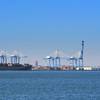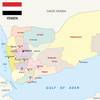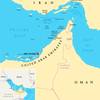Worsening congestion at Nigeria's major ports is crippling the economy of the West African sub-region. Manufacturers say essential cargoes are stranded at the ports and their factories are on the brink of closing down, as a standoff between importers and the government showed no signs of easing. "A number of those containers that have been out there for weeks contain industrial raw material," an industry source said.
Prices of manufactured goods in Nigeria and in the sub-region are reported to have increased noticeably, some goods by as much as 35 percent since the problems at the ports began three weeks ago.
Officials of the Manufacturers Association of Nigeria (MAN) said they would comment on the situation after a meeting in southeast Nigeria later on Thursday. Most of Nigeria's poorer neighbors depend on Nigerian industries for manufactured goods. Nigerian authorities say the cargoes are being held at the ports because the importers either concealed or under-declared their value and contents.
Owners of the seized containers are reluctant to pay the fines imposed by the government, an official of the Nigerian Ports Authority (NPA) said.
"No exports have left our ports in the last few weeks," he said.
"All the vessels that have managed to discharge their contents leave the ports empty without cargo. The shippers are complaining of losing money," said the official who asked not to be named.
Industry sources said the diversion of ships from the Lagos ports to neighboring countries has led to massive congestion of the ports in Cotonou, Abidjan and Douala.
"What is happening at the ports is a result of the inefficiency of the pre-shipment inspectors who are charged with the duty of inspecting all imports into Nigeria," one shipper said.
Scores of ships waiting to berth were still visible from the shoreline on Thursday.
The main container terminals at the Apapa and Tin Can ports are overflowing with cargo leaving no space for incoming vessels. "Every inch of available space has been occupied by containers. Parking spaces and lawns have all been taken up," an official said. "It will take weeks if not months to clear the stockpile of containers, and the ships have not stopped coming so the problem will persist for some time," he added.
The dry goods port at Lily in Lagos, which is still under construction, is also overflowing with containers.
Faced with the apparent failure of emergency measures adopted to ease the congestion, the NPA is considering diverting incoming ships to Port-Harcourt and Onne in southeastern Nigeria.
The government directed officials of the Nigerian Customs Service (NCS) to carry out 100 percent inspection of all cargoes to stem the congestion and alleged graft at the ports.
Cargoes have continued to pile up because the NCS does not have modern facilities to speed up the process of inspection.
The NCS has said it is granting importers whose containers were seized as a result of fraudulent declaration, a special concession to come forward and clear them before June 16 otherwise they will have to forfeit them. Importers blame the irregular practices at the ports especially under-declaration of the value and contents of cargoes on unfavorable government policies. "We...know that the so-called false declaration is caused by outrageous and unreasonably high import tariffs inflicted on the trading community by the government," importer A.S.P. Okenna said in a statement. - (Reuters)
Featured videos

Inside the Electrified Truckable Tug

Inmarsat Enhances Service to Drive Digitalization

Tracking Foreign Vessels Working in the U.S. Jones Act Market
Subscribe for
Maritime Reporter E-News
Maritime Reporter E-News is the maritime industry's largest circulation and most authoritative ENews Service, delivered to your Email five times per week









